Related
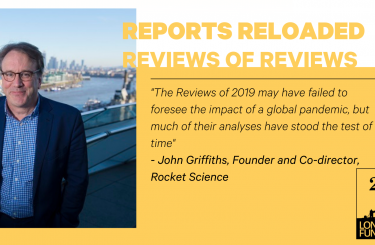
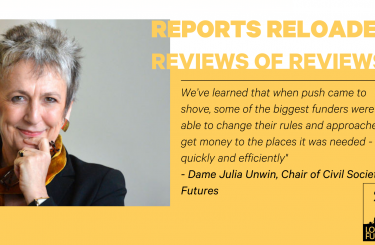
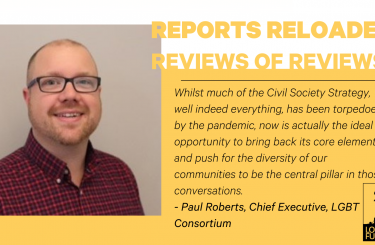
In the fourth piece of our Reports Reloaded, Jon Tabbush (Researcher, Centre for London) reflects back on Centre for London's strategic review of giving in London and asks what has changed, three years (and a pandemic) later.
In September 2018, Centre for London published ‘More, Better, Together: a strategic review of giving in London’, which reviewed the impact of the giving of time and money in London The report came to three headline sets of conclusions: about individual Londoners’ giving, the city as a geographical centre of philanthropy, and the capacity of the city’s charitable sector.
Fewer Londoners were found to be regularly giving time and money to charity than five years previously (2013) and rising wealth in the city had not led to increased giving. London’s growing dominance in sheer numbers of charities based in the city had not translated into increased resources for London-specific causes, as we noted once again in our recent strategic review, London Futures. The report called for the charitable sector to build its collaborative capacity and create a ‘whole city’ approach to giving – through richer data and more effective collaboration with London government and within the sector.
We unfortunately can’t assess how London’s philanthropic geography has changed in any conclusive sense – the Charity Commission hasn’t released new geospatial data since the time of the report. However, we can take a deeper look at the first and third set of conclusions - about individual Londoners’ giving and the capacity of the city’s charitable sector
‘More, Better, Together’ noted London’s falling donation and volunteering rates. The pandemic did not change this. During the pandemic, the fall in donations in London mapped onto the rest of the country and the number of adults who reported formally volunteering at least once a month for a registered organisation (the report’s metric) did not vary significantly between London and the rest of the country.
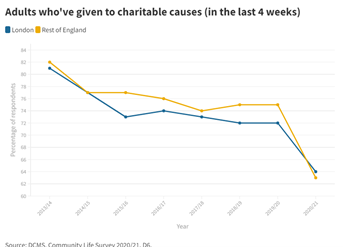
Even though the first COVID-related mutual aid groups were set up in inner London, the biggest increase in informal volunteering on a monthly basis occurred in the North East of England
Where it gets interested is in informal volunteering – performing unpaid assistance for anyone who isn’t a friend or family member – which saw significant increases. Looking again at monthly numbers, the same pattern emerges: from a lower baseline in 2017/18, London’s growth was smaller than that of the rest of the UK. In 2020/21, the capital saw an 11 per cent increase in informal volunteering, compared to an 18 per cent increase across the rest of the country. Even though the first COVID-related mutual aid groups were set up in inner London, the biggest increase in informal volunteering on a monthly basis occurred in the North East of England, which rose from 28 per cent to 38 per cent, the highest proportion in the country. We can only conclude that, despite the geographical concentration of registered mutual aid groups in London and their important role in supporting residents, they involved relatively few people by comparison to less organised, more individualised acts of social assistance.
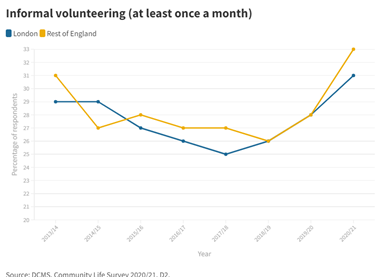
The financial impact of the pandemic on the city’s charities will put pressure on this vital work and as occurred after the 2008 recession, will no doubt see many important organisations close their doors
The focus of ‘More, Better, Together’ was on capacity building. In this regard, the last three years have seen many exciting developments. We called for the development of a richer understanding of need and giving in the city. Since then, as we recommended, Trust for London’s London Poverty Profile has since become significantly more granular, with data available down to the LSOA level, and studies like the Young Foundation’s Civic Strength Index have revealed deep divides in social capital and community capacity within the city. We recommended the Greater London Authority and Mayor of London work more closely and in a more organised fashion with London’s giving institutions. Since commissioning a review in 2018 into this question, London government has done excellent work coordinating volunteering efforts around Afghan refugees arriving in the city, while Team London, the Mayor’s volunteering organisation, now gives organisations access to more than 150,000 volunteers through a single platform.
Most promisingly, London’s ‘place-based’ giving movement, celebrated in our report, came into its own during the pandemic. The London Community Response, set up by London Funders, brought together 67 funders to donate over £57 million by spring 2021 to London charities, through five waves of funding. This initiative both promoted the ‘whole city’ approach to giving and showed how successful a single, multi-funder portal for applicants could be. London’s social investment scene is also growing fast - another bright spot in a dark few years, (on which more from us soon!).
But more still needs to be done, of course. The financial impact of the pandemic on the city’s charities will put pressure on this vital work and as occurred after the 2008 recession, will no doubt see many important organisations close their doors. London’s diverse communities are still not equally well-served - even the LCR’s excellent work during the pandemic carried the same inner-London tilt we noted in ‘More, Better, Together’. Nevertheless, the pandemic has encouraged a more coordinated approach to giving at an institutional level and saw unprecedentedly high levels of informal volunteering at the individual level. Local volunteering efforts have been recognised as key safeguards throughout the pandemic, including by central government. The goals of ‘More, Better, Together’ are still urgent – there is much more coordination to be done in particular - but the infrastructure created during the pandemic has given the sector a firm foundation on which to build.
‘More, Better, Together’ was funded by Sir Harvey McGrath, after an initial scoping exercise funded by City Bridge Trust. In the new year, we will be starting a project on impact investing in London – please get in touch with Claire Harding if you would like to be involved.


